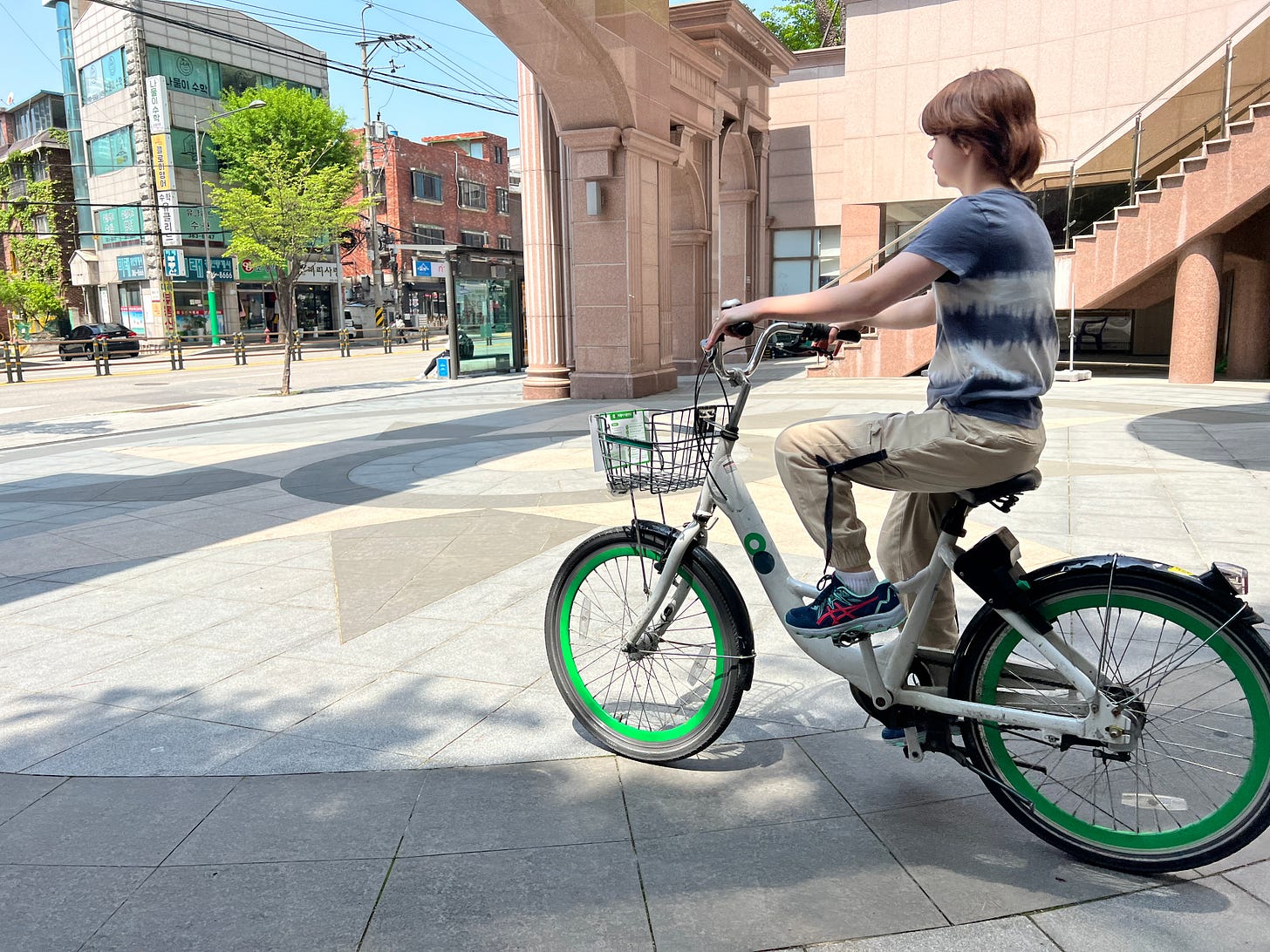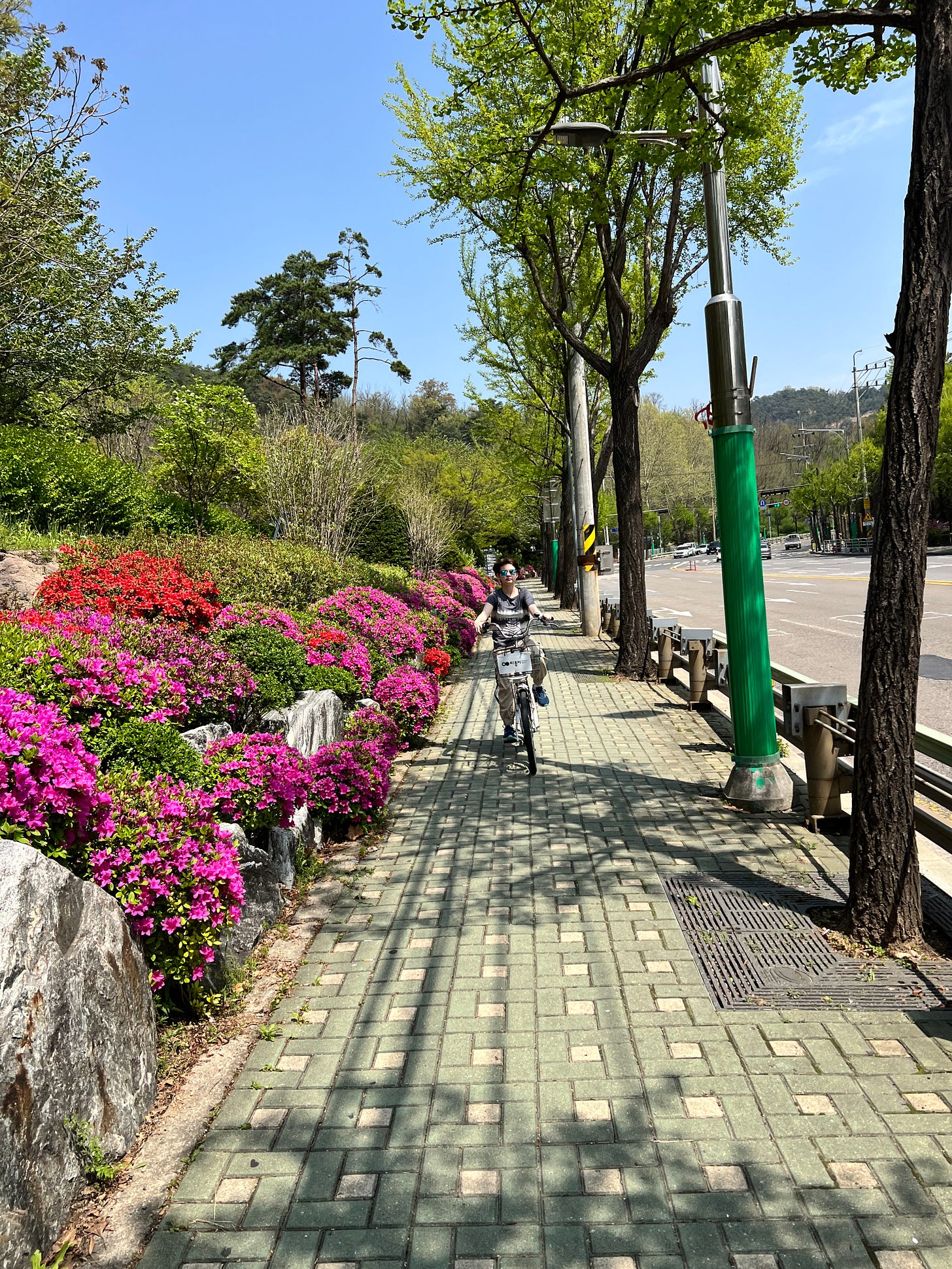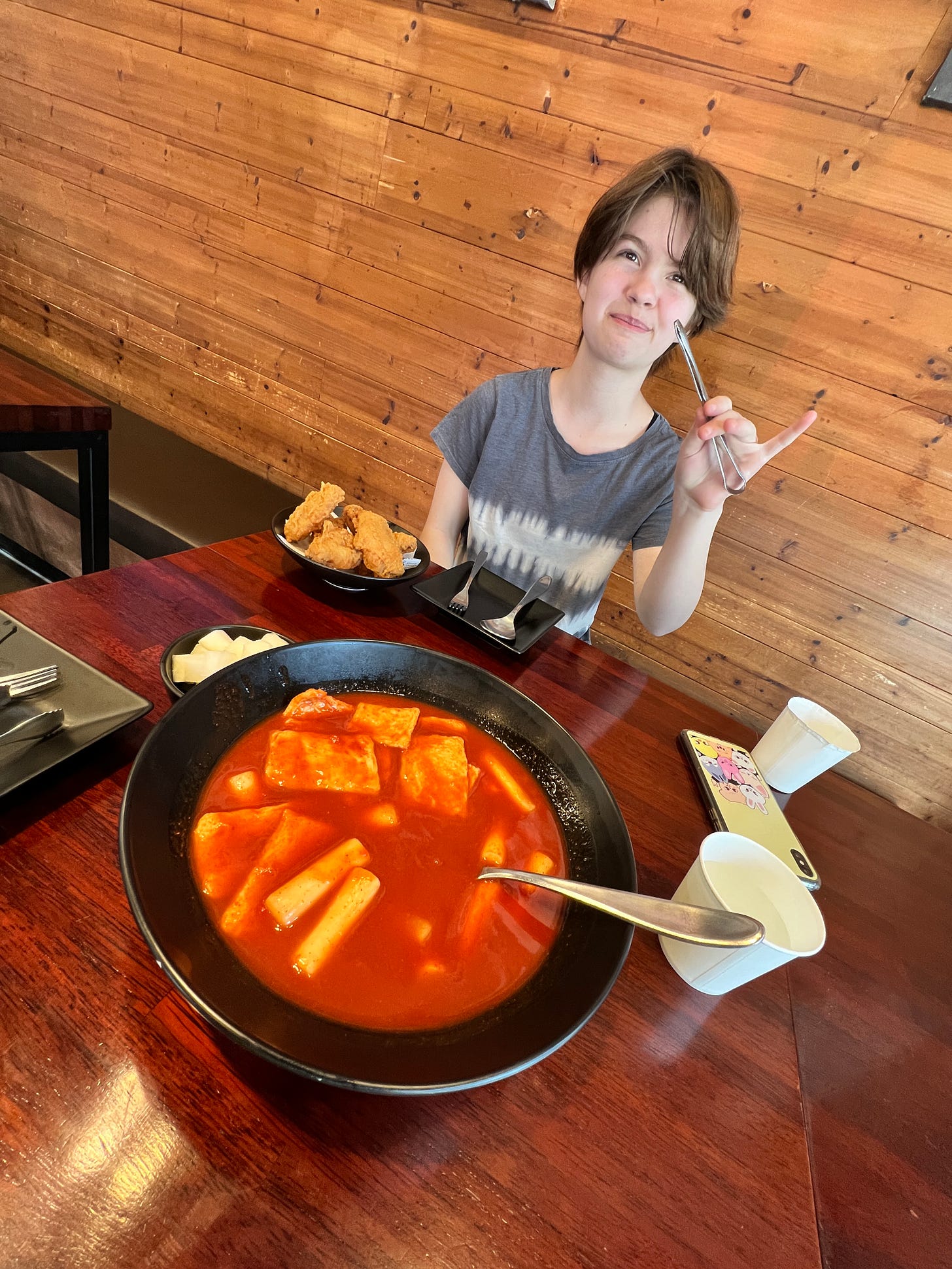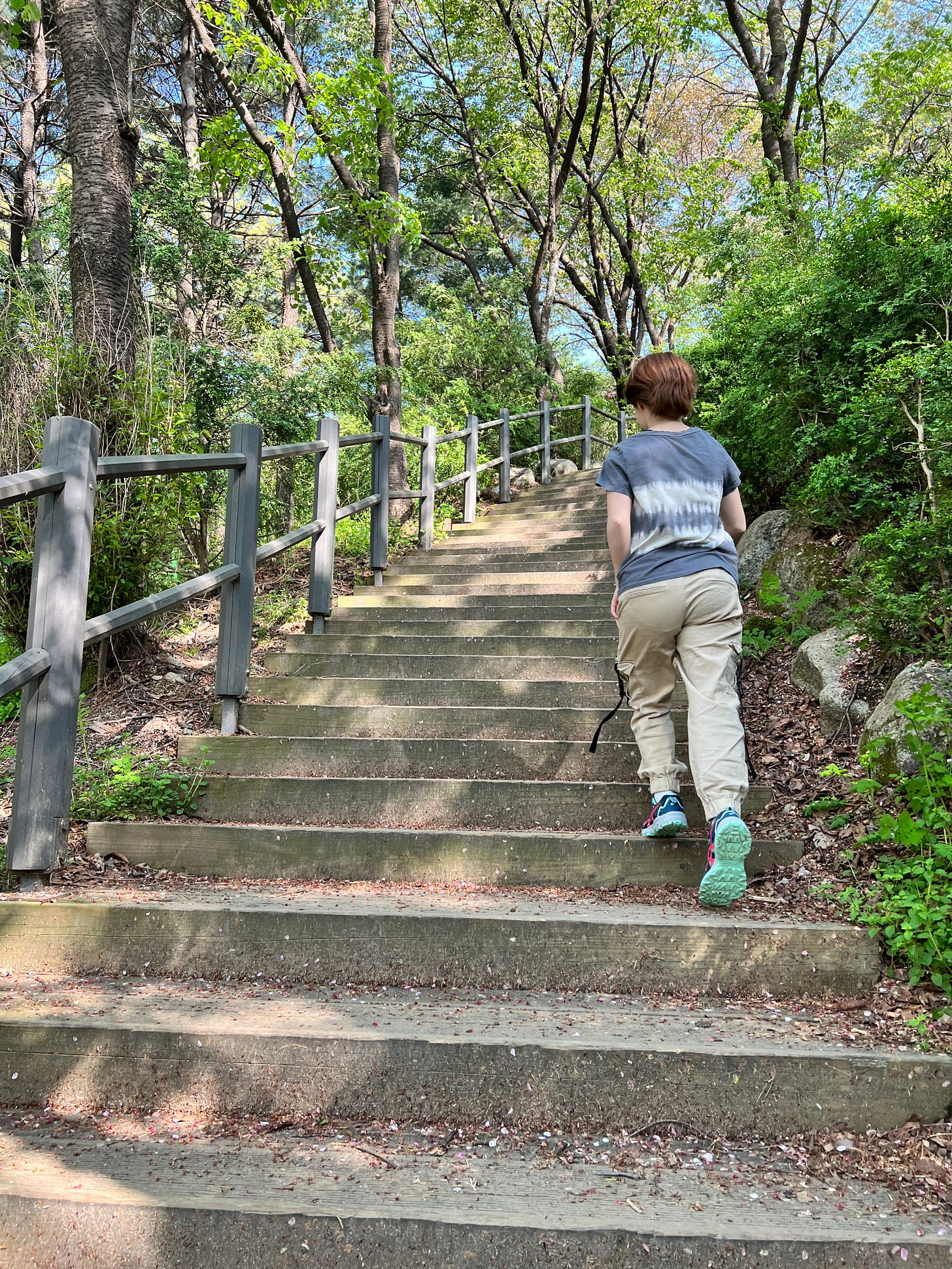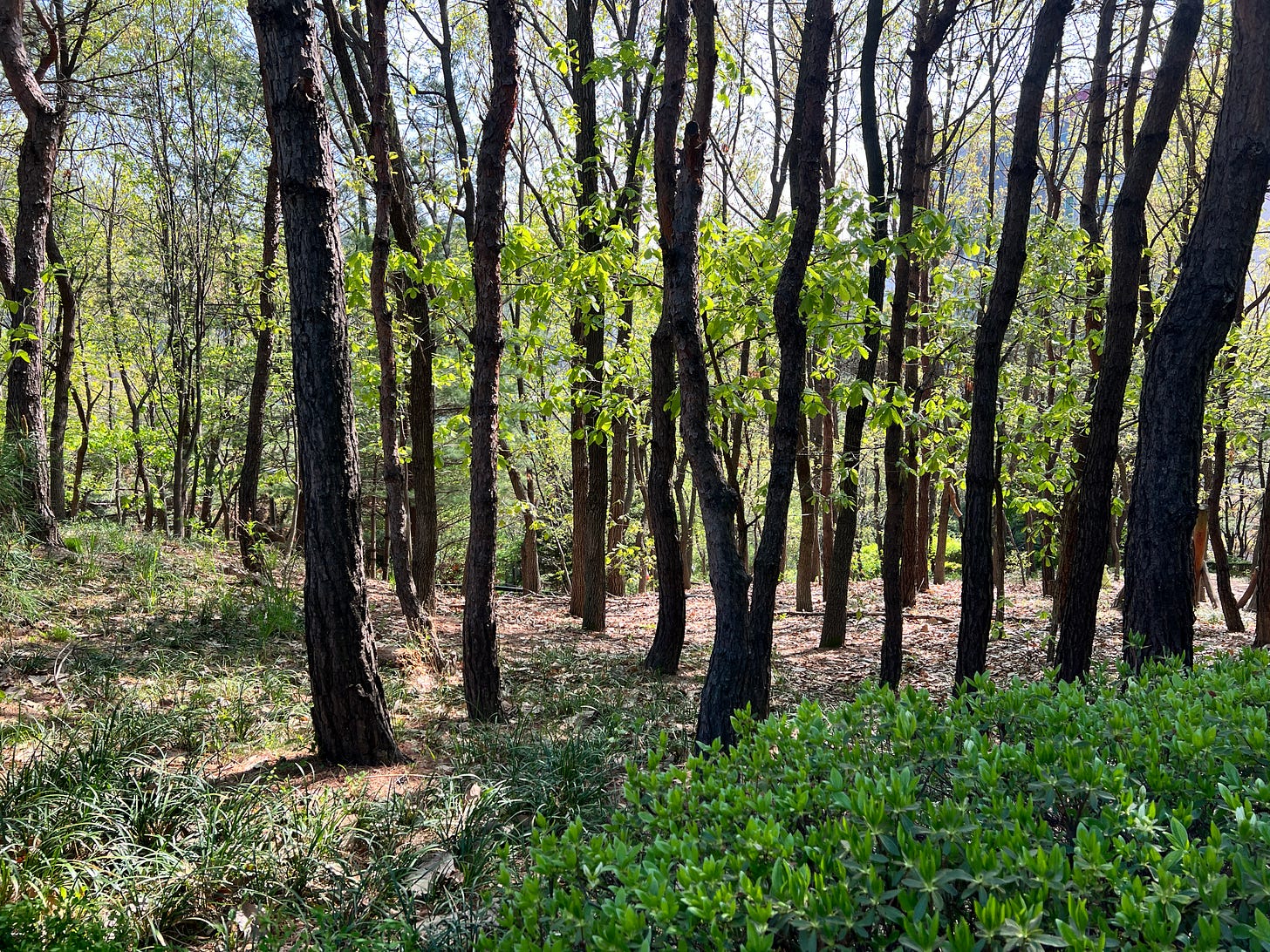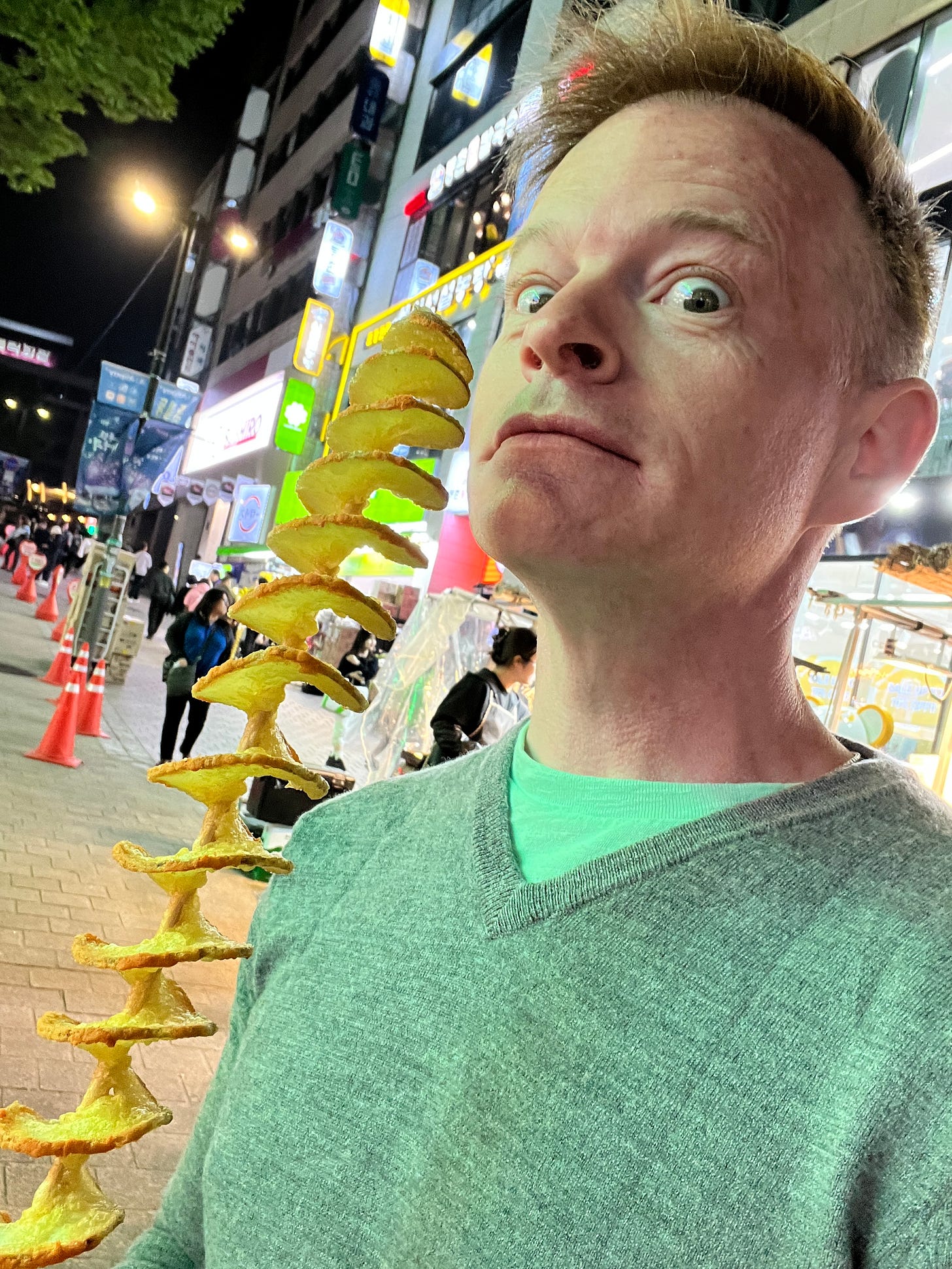About This Series
Wander, Wonder, Write is a travelogue of small moments and hard-won lessons, captured over two weeks while journeying across Korea and Japan with my thirteen-year-old daughter.
It’s not a guidebook. It’s not a highlight reel. It’s a record of the messy, beautiful work of learning to slow down, let go, and be present—for the places we visit, for the people we love, and for ourselves.
Know someone who would enjoy reading this? Please share it!
Our Last Day in Seoul
Today was supposed to be the quietest day of the trip. That’s what I’d hoped for, anyway. After nearly two weeks of motion—trains, planes, crowds, city lights, and language we didn’t speak—I had dreamed of something still. A day of forest, sky, and silence. We had heard of a remote Buddhist temple nestled in the mountains outside Seoul from some other tourists the day before. I thought it would be a fitting final breath before we left for Japan tomorrow. That was the plan.
We rode an hour out of the city by train, watching as skyscrapers dissolved into hills and farmland. Eventually, we arrived in a small village tucked into the edge of the mountains. No tourists. No English. No distractions. Just narrow roads, stacked buildings, and a winding path into the hills.
As we stepped off the train, I checked my phone for directions to the temple. That’s when I noticed something surprising: my battery was at 20%. The outlet in our hotel room had been loose, and the charger must not have connected properly overnight. I had only a faint signal, and no power bank. No backup. My phone was our only map. Our only way home.
I switched to low-power mode, turned off everything non-essential, and slipped it into my pocket. We’d have to ration our use.
As we walked through the town, we came across a row of rental bikes. She had been asking to rent bikes for days, ever since we first got to Seoul. It had become one of those small but persistent hopes that kept popping up. I’d hesitated each time—partly because it hadn’t really fit the itinerary, but mostly because I wasn’t sure how well she remembered how to ride. It had been years since she last sat on a bike. Still, she insisted, asking with a youthful zest for adventure that I found hard to resist.
I’ll be fine. I know how.
Today seemed as good a day as any. The trail to the temple was long, but paved. Bikes would make it easier—if she could manage it.
We walked over to the rentals, paid for two bikes, and rolled them down the sidewalk to an open area. As soon as she climbed on, I knew. Her balance was shaky, her legs unsure. She wobbled, put her foot down, tried again, stumbled. She nearly crashed into pedestrians as she tried, again and again, to mount the bike and begin pedaling. The memory of those long days riding the rail trail near our house was gone. Her body simply didn’t remember.
Checking my watch, I noted it was only 10 a.m. We had the entire day to figure this out, so I decided to slow things down. We found a small open plaza and started from scratch. I coached her patiently—how to mount the bike, how to maintain balance by pedaling, how to steer and stop. We practiced for over an hour in that little square. She fell. Got back up. Tried again.
Eventually, when she thought she was ready, we set out.
Almost immediately, while trying to thread a tight gap between a concrete barrier and a light post, she clipped the pole and crashed. I skidded to a stop. She was standing beside her bike. Her face was stoic, but I could tell she was stunned. The fall hadn’t hurt her physically, but I could see the impact in her face.
What’s going on? I asked—not gently, not with curiosity, but with heat, frustration, irritation. The message in my voice and the look on my face was clear: stop fooling around and get it together!
I didn’t mean to sound sharp, but I did. The frustration wasn’t about the bike. It was about fear. We were far from help, my phone was dying, and this route was harder than expected.
She stood silently beside her bike. Then her expression collapsed. She began to cry—deep, wordless sobs of frustration, fatigue, and disappointment. It had been building for days, and the weight of the exhaustion combined with the sleep deprivation and physical exertion just undid her.
Oh crap, I thought. Now I’ve done it. I’ve pushed her too hard. I lost sight of the bigger picture. I screwed it all up.
I put the bikes off to the side and hit the emotional reset button. I held her close, letting her cry into my shoulder. I patted her back. I reassured her everything was going to be okay.
I just want to do it so badly, she whispered. I hate that I can’t.
I wrapped my arms around her and held her close. I apologized—not just for my tone, but for pushing her too hard. For not seeing how much this mattered to her.
She is so driven. So determined. Most things come easily to her, and when they don’t, the pain runs deep. I reminded her we could take it slow. We didn’t have to make it to the top. Whatever we did today would be an adventure.
Go easy on yourself, kiddo. You’re doing fine. We’re gonna get there.
We climbed back on and started again.
The road got steeper. The sidewalks narrower. Pedestrians everywhere. The bikes only had three gears, and every inch felt like a battle. My legs burned. Hers must have been on fire. Still, she pressed on.
Eventually, the road curved sharply upward into the mountain. The incline ahead looked like something out of a video game—absurd and relentless, a winding slope that stretched for more than a mile. We stopped at the base of it, panting.
I looked up. Then back at her. We both knew.
We could do it, but at what cost? We had pushed ourselves every day. Our bodies were tough, but not without limits. This might be too much.
Reluctantly, we gave up the idea of biking to the temple and turned around.
A Renewed Effort
Back in the village, we dropped off the bikes and found a tiny restaurant for lunch. My phone was down to 10%. I ordered tteokbokki—spicy, chewy rice cakes swimming in a red sauce that punched me square in the throat. I loved it.
She laughed at me as I coughed and reached for water. We returned to our casual banter, sampling the kind of authentic Korean food the locals eat.
This place is awesome, she grinned.
When we asked for a bathroom, the restaurant owner pulled out a hand-drawn map and pointed to a few intersections and alleyways. It looked like something out of The Legend of Zelda. Then she pointed to a roll of toilet paper mounted beneath the counter.
For ladies, she said.
My daughter and I looked at each other. Apparently, they don’t stock toilet paper in the bathroom itself. She grabbed a wad, and we departed in search of a toilet hidden somewhere in the town.
We followed the map, but nothing looked right. We backtracked. We wandered. We looked up and down the streets for any sign of a restroom. Nothing.
We stopped at a corner shop and asked for directions. The woman behind the counter nodded, handed us a key, and launched into rapid-fire Korean. My daughter did her best to follow, but it was obvious she didn’t understand.
When we stepped back onto the street, she chuckled.
I feel like I’m on an epic quest and just got a side item. First a map, now a key! What’s next?
We wandered some more, still confused. Then, to our surprise, the shopkeeper hurried out of her store, waved us over, and ushered us into a nearby apartment building. She led us upstairs, used the key herself, and opened a door to a small, clean bathroom tucked into a stairwell. Then she smiled, waved, and jogged back to her store.
Did she just let us use her private apartment building’s bathroom?
Yes. I think she did.
After lunch, we decided to try for the hike again, this time on foot. We passed a nearby park where locals were using outdoor fitness equipment like a full gym. We’ve seen this everywhere—big cities, small towns. Fitness is just part of the culture here. No excuses. No I’m too old for this. Just movement.
The town was filled with 80-year-olds wielding hiking sticks and backpacks, outfitted in North Face shirts and serious outdoor gear. The culture here is so cool. We both love it.
Seeing an opportunity for some physical exercise, she jumped into the park’s equipment with wild abandon. She tried every machine, calling out, What does this one do? How does this one work?
I stopped at the pull-up bars and did a max set. She tried to do one unaided—a goal she’s had for some time. I sat in the shade and watched as she returned to the pull-up bar again and again, determined to conquer it. She just wouldn’t give up.
I’m so jealous, she said, returning to me. When will I be able to do pull-ups?
Keep trying, I told her. It took me a while to do one. Then a while longer to do twenty. It’s all a process. Go easy on yourself.
I repeat that line to her constantly these days. They are words to live by for the crazies like us—the ones who just can’t help but push ourselves to the limit.
It was nearly 3:30 p.m. and GPS said we still had 30 more minutes of walking—straight uphill. Our feet were swollen and sore. I had seen a few taxis earlier, so I suggested we try again.
We waved one down, and a man pulled over. He got out and stood near us as she tried to explain our destination. No matter what she said, he didn’t seem to understand. She tried Google Translate, even showing him the name of the temple in Korean. Still nothing.
As she struggled to find the right words, he gruffly waved his hands, shook his head, and—while she was still speaking—turned away and drove off.
She stood there, mid-sentence, her shoulders dropping.
I’m sorry, Dad. I tried.
That’s okay, kiddo. You did a great job. You did the best you could. Go easy on yourself.
We soldiered on, up the hill.
Eventually, we found another taxi idling at the curb and approached him. This time, I showed him the name of the temple on my phone. He squinted, tried to type it into his GPS, but couldn’t make sense of it. He asked a few questions in Korean that we didn’t understand. After a few minutes of back-and-forth, he shook his head, closed his window, and drove away too.
I looked down. 7% battery.
I turned off the phone completely.
We began to walk again. The road climbed, slowly but relentlessly, until we reached a tunnel carved into the mountain. The sidewalk ahead simply ended. There was no walkway through the tunnel on our side of the street. Just a dead end.
Across the highway, we could see a protected sidewalk entering the tunnel—but concrete barriers prevented us from crossing, and cars whipped by at breakneck speed.
There was no safe way across.
We had walked nearly a mile uphill—only to realize we’d been on the wrong side of the road all along.
That’s when she broke.
She turned away from me, stomping downhill, arms crossed, her body radiating frustration. I called after her. I tried to talk. She snapped back, defensive, raw.
Well, everything was fine until you yelled at me when I fell off my bike!
I didn’t yell, I said quietly. I was sharp. I was impatient. But I didn’t yell.
You raised your voice.
I didn’t raise my voice, I replied. I used pointed language, and I was wrong to do that. I’ve already apologized. But I need you to be honest with your words too.
She kept walking ahead. I called out again.
Please don’t walk ahead of me. I am trying to talk to you, and it feels like you’re being intentionally rude.
I don’t want to do this anymore, she snapped. This was YOUR silly idea.
A surge of irritation shot through me, and I could feel my patience waning quickly. I had spent this entire trip prioritizing her experience, her joy, her wonder. Today—this one day—I had asked for something. One simple thing.
And now it felt like even that was being taken.
I felt the twin dangers of resentment and self-pity creeping in. I wanted to stomp and yell and say, Why does it always have to be about everyone else? Why can’t I just have this one thing?
I could see how easy it would be for me to sulk the rest of the day. To punish her with silence. To ruin everything we had built.
I once behaved like that when I was disappointed and didn’t get my way. Thankfully, those days are behind me.
We walked a few more minutes in silence until we reached the trailhead. I asked her to sit quietly. I took a bench nearby.
I looked up the mountain in front of me, seeing the hikers silhouetted at the summit. I looked at the trees surrounding me, knowing this was the closest I would get to nature today.
I closed my eyes and tuned into my surroundings. I felt the sensation of the seat beneath me. The air brushing against my arms. The songbirds calling from the trees. I tuned into my body, my breath, my heart.
My presence is the only thing I need right now. Just presence. And with that presence, comes peace.
Slowly, I let go. I let go of the dream of the temple. I let go of the expectation. I let go of the regret.
I reminded myself of some basic truths:
My daughter is thirteen years old. She’s been on the road for nearly two weeks—away from home, away from her mother, away from everything familiar. We have averaged nine miles of walking every day. And she has kept up without complaint, without tantrums, without bitterness.
This isn’t about getting what I want. This is about demonstrating compassion. This is about modeling patience. This is about showing her how healthy relationships survive hardship. This is about love.
After twenty minutes of silent meditation, I rose and walked over to her. She was lying face down on the bench, her head turned away from me. I pinched her foot gently to let her know I was there.
Hey kiddo. Let’s start over. You ready to talk?
She rose quietly and hugged me tightly, crying into my shoulder.
I’m so sorry, Dad, she whispered. I know this was all you wanted to do. This was something you talked about doing since before we left home. And I screwed it all up. I’m so sorry I just can’t do things like you can. I’m sorry I’m not stronger.
I had watched her beat herself up all day. From almost the moment we arrived, she had been trying—and failing—and trying again, collapsing into frustration each time. Over and over, she pushed herself beyond what she was ready for, and each time she stumbled, the disappointment in her heart grew heavier.
These words—I’m so sorry I just can’t do the things like you can… I’m sorry I’m not stronger—are so familiar to me. I’ve known them intimately for years. I have spoken them to myself in a thousand different ways.
This entire journey with her has been like looking into a mirror. A memory of my own past struggles. The impatience. The unwillingness to understand myself as being in process. As still becoming.
I’ve been there.
And it’s unfair to her, because she sees me now as someone who can do everything—play piano, climb mountains, haul our bags through subways, navigate foreign cities with confidence. She sees a strong, competent man who never struggles.
But she doesn’t know.
She doesn’t know I worked 60+ hour weeks and still got passed over for promotion—twice. She doesn’t know that most of my funded grant ideas were ones I had collaborated on with others. The ones that really mattered to me—the ones I dreamed up alone, poured my heart into, stayed up late sketching on napkins and scrap paper—they never got funded. They didn’t even get a comment. Not even a nice try or maybe next year.
She’s seen me run and finish dozens of races. She’s watched me cross finish lines, arms lifted in victory. But she doesn’t know that I didn’t finish my first marathon. She doesn’t know I barely made it halfway before giving up—exhausted, humiliated, swallowed up by a shame I carried quietly for years.
She doesn’t know because I don’t tell her. Because I lived so long exactly where she is now—angry, heartbroken, terrified that I would never be enough.
And she just wants to be like me.
But the truth is, I don’t want that.
Because, honestly, I’m not always easy to be around. I can be intense in ways that wear people down. I move fast. I think fast. I expect a lot—from myself, from the world, from the people I care about most. I learn quickly. I excel at things. And even when I don’t mean to, I sometimes make others feel less than just by being who I am. Not because I boast or brag. Just because I’m too much.
I’ve always been too much.
I don’t want her to drive herself so hard that she pushes her body past its breaking point… the way I did. I don’t want her to redline her spirit for years, convinced that winning is the only thing that matters, only to wake up one day and realize she has lost sight of a life built on connection and purpose… the way I did. I don’t want her to inherit the long lineage of restless, afflicted souls that runs through my bloodline—the ones whose talents came wrapped in grief; whose ambition, untempered, led them into darkness, addiction, and despair… the way it did for me.
I don’t want her to be like me.
I want her to be free.
So you’re not disappointed in me? she asked, her voice so small and uncertain.
No, kiddo, I said. We’re in this together.
And I meant it. Every word.
And so, with the sun beginning to set behind the mountains that would not permit us to enter them, we abandoned the last hope of visiting a temple and communing with nature. We turned back, walking quietly toward the train station, hand in hand. We boarded the train for Seoul and sat side by side, saying little. But something had settled between us. Not resolution, exactly—but a resting point. A breath.
Today, I just wanted to get out into nature and relax. I just wanted to be quiet for a while; to enjoy the last of Korea before we headed to another adventure in Japan.
Nothing worked the way I wanted today. And if I look at things through one lens, today looked like a failure.
But I wasn’t a failure today.
I held my temper. I demonstrated patience. I modeled tolerance and grace. I showed love.
I was a good father today, under some pretty difficult circumstances. Not perfect. But present. So I show myself some grace and remind myself that what we are doing on this trip is pretty tough by anyone’s standards.
And so, wrapping up this, our last day in Korea, I tell myself the same thing I told her all day. The same thing I tell myself every day, over and over, as I attempt to live authentically, fully:
Go easy on yourself.
About the Author
E.S. Vorm, PhD is a writer, traveler, father, and lifelong student of becoming.
After years spent chasing external success—as a military aviator, scientist, and academic—he now finds his greatest purpose in the quieter work of raising a family, exploring the world, and learning how to live with more grace, patience, and presence.
His writing explores the tender intersections of ambition, imperfection, resilience, and love.



